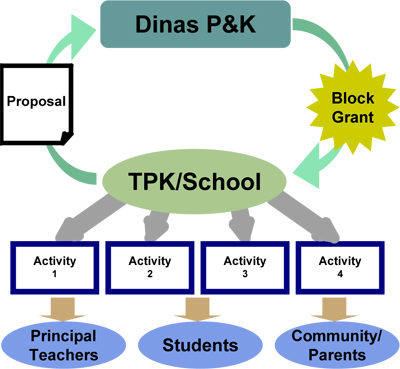What is the PRIMA-P model? (1)
Outline: Combination of PSBM and Lesson Study
PRIMA Pendidikan (Education) is the abbreviated name of a project entitled Integrated Plan for Junior Secondary Education Improvement in South Sulawesi. Since 2007, the Government of South Sulawesi Province has been implementing PRIMA Pendidikan, jointly with the Japan International Cooperation Agency (JICA), in three kabupaten of the province.
The main target of PRIMA Pendidikan is junior secondary schools. The project employs a model that combines two approaches developed by REDIP(*1) and SISTTEMS(*2), respectively. The approach (or model) developed by REDIP is now officially termed PSBM (Pengembangan SMP Berbasis Masyarakat, participatory school-based management) by MONE. The approach introduced by SISTTEMS is Lesson Study. Both approaches proved to be suitable, workable and sustainable in Indonesia to improve junior secondary education under the decentralized administrative system. In following sections, the two approaches will be outlined.
*1 REDIP is an abbreviation of the Regional Education Development and Improvement Program. REDIP is also a JICA-assisted program implemented by MONE during 1999~2008.
*2 SISTTEMS (Strengthening In-Service Teacher Training of Mathematics and Science Education at Junior Secondary Level) is another JICA-assisted program done by MONE. It introduced the Lesson Study approach from Japan as a means to improve classroom lessons through teachers’ peer groups. It started in 2006 and ended in 2008.
PSBM (participatory school-based management)
Despite its relatively small geographical coverage, REDIP has generally proved to be an effective model to improve junior secondary education in Indonesia. In fact, the model was so designed from the beginning as to be in line with MONE’s three basic strategies for better education:
- School-based management;
- Community participation; and
- Decentralization.
The three strategies have worked well with REDIP. REDIP has thus attested the workability of these strategies on one side and, on the other, proved to be a general model appropriate for improving junior secondary education.
Simple Process of REDIP
REDIP is a simple program as shown in Figure 1. It provides a block grant to schools and TPKs according to their proposal. Schools and TPKs are basically free to propose whatever activities they like according to their needs and priority. Spending the block grant, schools and TPKs conduct the activities as proposed. After finishing the term, they prepare a financial report and an activity report to submit for review. Simple forms for the proposal and for the two reports are all provided in the guidelines.
Figure 1 REDIP Process (*)
REDIP does not instruct schools or TPKs what to do. Rather it encourages them to take initiatives and responsibilities for their own efforts of educational improvement, stopping being mere passive observers. It also values their learning by doing. REDIP’s process is simple and does not intimidate people with rigorous or tedious rules to follow.
REDIP is a simple but comprehensive program which enables schools and kecamatan to satisfy their needs according to their own aspiration and priority. Although simple, it can improve access, quality and management simultaneously as a result. This is why REDIP has been unanimously welcomed and accepted by many people at various levels.
* Dinas P&K in the figure means District Education Office.
Basic Principles of REDIP
Many people like REDIP because they like its basic principles. Five of them are:
- Empowering school and kecamatan - two engines of educational development: REDIP provides block grants both for schools and TPKs at the same time. When schools and TPKs are empowered simultaneously, they can create synergetic effects. Schools and communities can get closer and work together. They are the two engines for educational development.
- Equal opportunities for all schools: REDIP covers all kinds of junior secondary schools in a kecamatan (public SMP, private SMP, public MTs, private MTs, open SMP, and Satu Atap). No school will be left out.
- Bottom-up planning, proposal-based activities: Schools and TPKs should assess their situation, make a plan, write a proposal, conduct activities, and evaluate the results. In this way, they become responsible for the whole process of educational improvement.
- Freedom to choose: Schools and TPKs can implement any activities they like as far as there is a firm consensus and as activities can effectively improve access, quality and/or management.
- Accountability and transparency: REDIP entrusts a block grant to all schools and TPKs for their use. In turn, schools and TPKs have an obligation to respond to any inquiry (accountability) and disclose all information (transparency).
- About JICA
- News & Features
- Countries & Regions
- Our Work
- Thematic Issues
- Types of Assistance
- Partnerships with Other Development Partners
- Climate Change / Environmental and Social Considerations
- Evaluations
- Compliance and Anti-corruption
- Science and Technology Cooperation on Global Issues
- Research
- JICA Development Studies Program / JICA Chair
- Support for the Acceptance of Foreign HRs / Multicultural and Inclusive Community
- Publications
- Investor Relations
